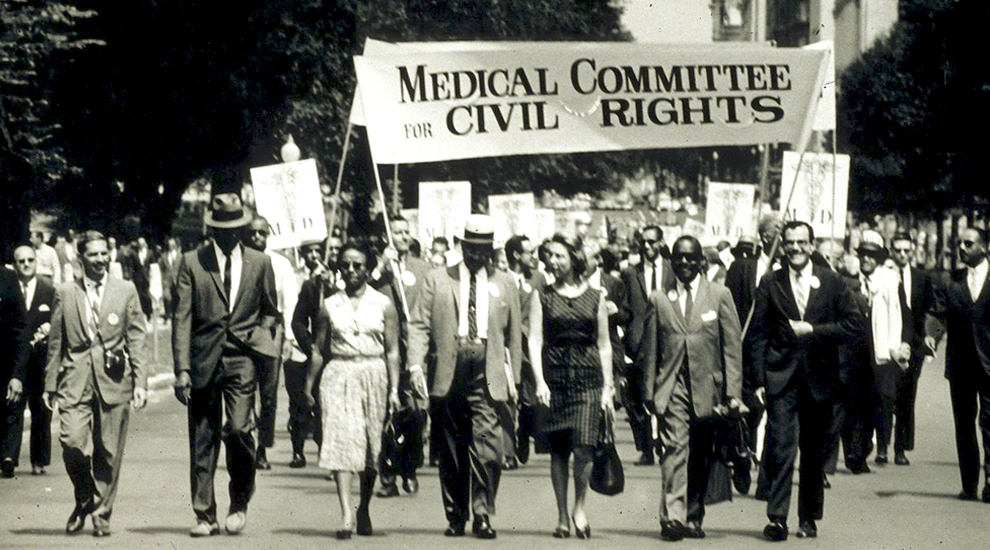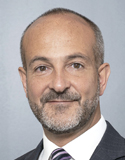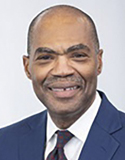
The Power to Heal documentary, viewed recently at an online event sponsored by the MMS, explores the role of physicians in advocating for passage of Medicare, as well as obstruction by some leaders in organized medicine.
Learning from the past to drive social change today was one of many takeaways from a Massachusetts Medical Society screening of Power to Heal, a documentary about the coordinated effort to create Medicare in the early 1960s that catalyzed
racial desegregation of thousands of hospitals in the United States.
Among the 175 attendees, many described an eye-opening look at the powerful politics and advocacy that one viewer called a historic “intertwine of civil rights and health care” of which many were not fully aware.
“I lived and functioned as a doctor during the period discussed,” another physician wrote in a post-screening survey, “and while I was aware of segregation, I had no idea of the severity of the problem and the enormous efforts necessary to improve matters.”
Another viewer described the film’s most important takeaway as “the tremendous effort, length of time, degree of sacrifice, and expansive collaboration it took to make even small advances for equal access to health care that even today in 2021 . . . are
still not fully actualized.”

Dr. Joseph Betancourt
Immediately following the November 17 online screening of the one-hour public television documentary, a live panel that included the film’s producer and four MMS physician members who are thought leaders in racial equity in health care reflected on the
film and its meaning for today.
Moderator Joseph Betancourt, MD, MPH, senior vice president, Equity and Community Health, Massachusetts General Hospital, and Kevin B. Churchwell, MD, president and CEO, Boston Children’s Hospital, noted the film showed that policy changes, such as the
introduction of Medicare, can alter behavior, even if some peoples’ hearts and minds are unchanged. “It was just a small step in a long journey,” Betancourt added.

Dr. Kevin Churchwell
“It made me think about how much work has been done and how much more work we have left to do, especially in this time where people are having this racial awakening,” said activist and writer Lash Nolen, student council president, Harvard Medical School
Class of 2023, and a member of the MMS Medical Student Section. This is particularly important in today’s climate of racial awakening, she noted, when society is “really starting to have important conversations” about the challenges of
systemic racism.

Lash Nolen
“This documentary teaches us that we can’t have policies, ideas, and campaigns without any teeth to back them up. We can say all day that we’re committed to ending systemic racism,” she continued, “but if we don’t have ways to make sure that those policies
are truly making a difference on the ground and to make sure . . . folks are following through to the end, then they’re just words. This [documentary] is a great lesson that really teaches us the path to follow moving forward.” MMS member
Ellana Stinson, MD, MPH, this issue’s Member Making a Difference, also spoke on the panel.
The 2018 documentary previously was shown earlier in 2021 at a Berkshire District meeting and in a screening sponsored by the MMS Minority Affairs Section and Committee on Diversity in Medicine.
In the survey after the recent November showing, 38 of 41 respondents rated the event “extremely useful” or “very useful.” Some expressed new appreciation for President Lyndon Johnson’s role in desegregating health care — and dismay at the obstruction
put forth by some leaders in organized medicine. Many suggested more widespread viewing among physicians, in hospitals, and as “perhaps as required viewing for medical students.”
The event kicked off the second year of the Focus on DHE&I: Diversity, Health Equity, and Inclusion Best Practices Series sponsored by the Massachusetts Health & Hospital Association, the Massachusetts Medical Society,
and the Massachusetts Chapter of the American College of Healthcare Executives. The first year drew more than 1,200 viewers to its four webinars. This year’s remaining three webinars include the following:
-
The ROI of DHE&I: Building the Business Case with expert faculty Juan Fernando Lopera, chief diversity, equity, and inclusion officer, Beth Israel Lahey Health, on February 9, 2022, 12:00–12:45 PM. Please register at www.massmed.org/value-of-DHEI.
-
Planning is underway for webinars in spring and summer.
A video of the MMS discussion that followed the Power to Heal documentary can be found here.
To host a screening of Power to Heal at a community event or in your workplace, contact www.blbfilmproductions.com/request-viewing.html.
